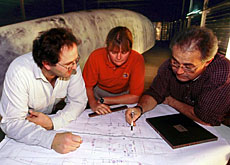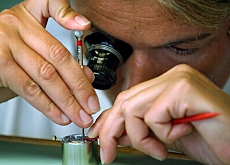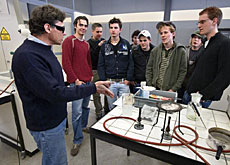Skills shortage troubles engineering industry

Swiss engineering firms are struggling to fill their ranks with local talent as students turn their backs on technology-based courses in favour of social sciences.
The growing lack of skilled engineers could weaken Switzerland’s competitiveness as companies move their focus abroad, taking research budgets with them, industry experts fear.
Estimating the exact size of the black hole is not easy in a buoyant economy that is generating new jobs at a furious rate. But Switzerland is facing a shortfall of at least 1,500 qualified personnel and perhaps as many as 5,000.
“More and more of our members are telling us about a structural shortage in Switzerland, Germany and the rest of Europe,” Dorothea Tiafenaur, spokeswoman for umbrella engineering body Swissmem told swissinfo.
Engineering giant ABB alone currently has 100 vacancies and has resorted to filling them with skilled workers from China and India. Chief executive Fred Kindle recently spoke of a “serious problem” in Switzerland.
Other companies such as Sulzer and Georg Fischer are also experiencing problems recruiting the right staff. The problem even extends to the finance sector where telecommunications and IT support personnel are in demand.
The problem does not look like ending in the short term as fewer students take up engineering and technology courses. Official figures from 2004, recently released, show an 11 per cent drop in university students and a six per cent fall in technical college students taking up these subjects.
Education
Part of the reason for this is a traditional lack of interest in such studies, according to Marina de Senarclens, head of the Engineers Shape Our Future foundation. She also points to faults in the education system and short-sightedness on the part of some companies that do not invest in apprenticeships.
“The lack of students is related to a cultural tradition in Switzerland. In particular, very few girls are interested in scientific and technical studies,” she told swissinfo. “And in the past 20 years the education system has devalued sciences.”
“We have also witnessed a recent change in the business sector where some companies are purely profit driven and give fewer apprenticeships to youngsters,” she added.
Engineers Shape Our Future has been trying to reverse the education trend since its inception in 1987 by visiting schools to promote the benefits of science and technology courses.
There are signs that the message is getting across as Zurich’s Federal Institute of Technology enrolled significantly more students in technology courses in 2005 than in the previous year.
But unless the trend continues, Switzerland faces future problems, according to de Senarclens.
“Switzerland’s competitiveness relies on technology. The industrial sector is one of the country’s main exporters,” she said.
“If companies have to find employees abroad the danger is that they will start to switch to offshore production and research and development, and will only have holding companies left behind.”
swissinfo, Matthew Allen
In 2004, more than 5,400 students enrolled on science and technology higher education courses, comprising 18% of the total intake.
Universities accounted for 3,568 of these students – 11% fewer than 2003.
Women students made up 23.8% of this figure.
In technical colleges, a total of 1,854 enrolled on such courses – 6% fewer than the previous year. Some 13.4% were women.
Economics Minister Doris Leuthard and Education Minister Pascal Couchepin jointly launched a new government initiative last month, called NaTech Education, designed to better integrate technology into the education system.
It is also hoped that the Bologna education reforms, that harmonise courses and qualifications across Europe, will encourage more students to take up higher education courses in Switzerland.
Engineers Shape Our Future is supported by 27 companies, including ABB, Sulzer, Alstom, Siemens and Schindler.

In compliance with the JTI standards
More: SWI swissinfo.ch certified by the Journalism Trust Initiative



You can find an overview of ongoing debates with our journalists here. Please join us!
If you want to start a conversation about a topic raised in this article or want to report factual errors, email us at english@swissinfo.ch.